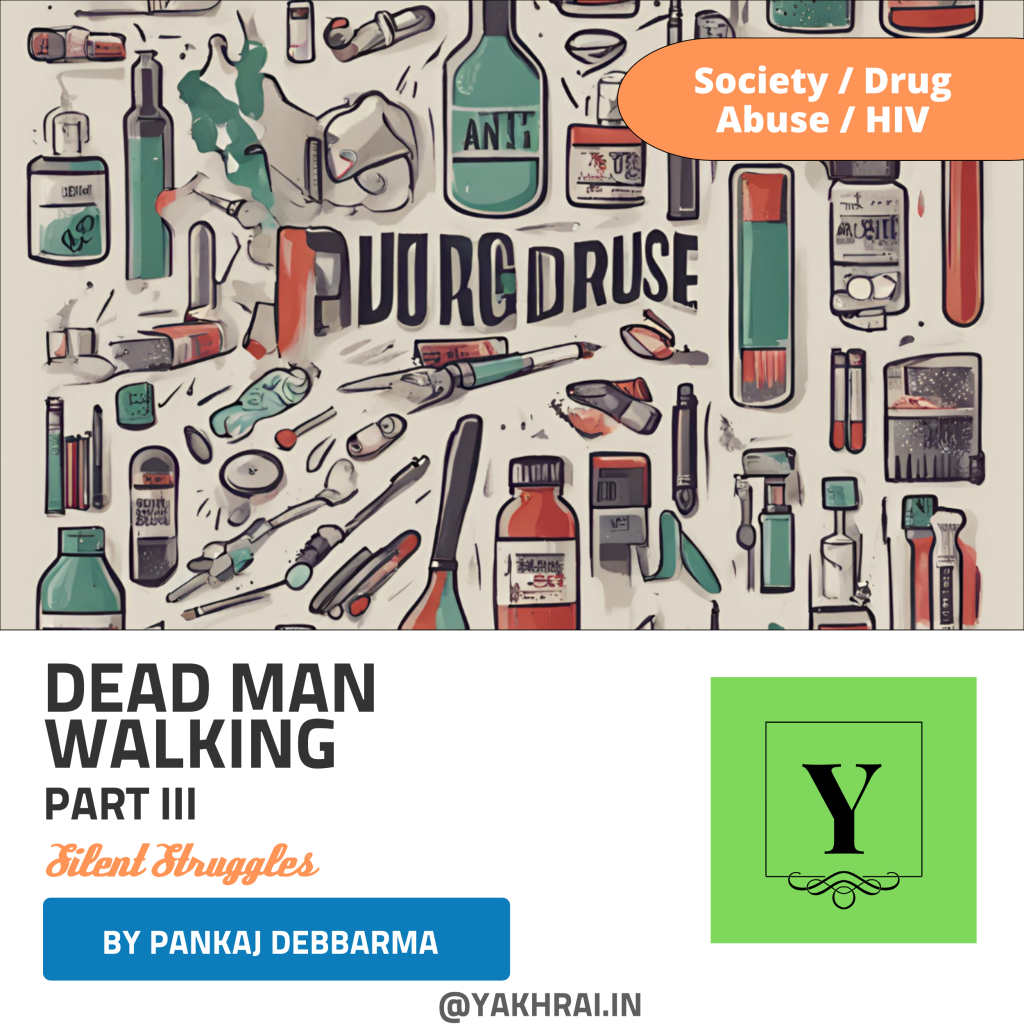Silent Struggles
By Pankaj Debbarma
May 9, 2024
In the heart of Tripura’s countryside lies a village, its landscape veiled in a profound silence that echoes the hidden struggles of its inhabitants, particularly those ensnared by the treacherous grip of addiction. Among them is Baithang, whose journey through life, once illuminated by the promise of youth, now navigates the shadowed alleys of despair under the heavy weight of addiction. Yet, in this village where whispers of suffering mingle with the rustling of leaves, the true depth of the tragedy unfolding defies mere statistical analysis.
Tripura’s countryside, though scenic, conceals a darker reality. It serves as a corridor for drug trafficking, a fact well-known among its inhabitants. However, despite this reputation, there is a glaring absence of government prevalence studies on drug abuse in the region particularly among ethnic indigenous communities of Tripura. Unofficial reports hint at a heightened prevalence among these ethnic groups, yet concrete data remains elusive. This absence underscores the pressing need for thorough research and intervention strategies. The village’s plight goes beyond mere statistics, urging recognition of the human stories hidden beneath the numerical voids.
Baithang’s descent into addiction began innocently enough—a rebellious puff of a cigarette during his teenage years. But what started as a casual experiment soon transformed into a dark journey, pulling him deeper into the abyss of self-destructive behaviour. Seduced by the initial allure of marijuana, Baithang’s experimentation escalated, leading him down a path fraught with peril. From marijuana rolls to the deadly allure of synthetic brown sugars, Baithang found himself ensnared in a tangled web of addiction. Each hit, each high, served only to deepen his despair, until he became a mere shadow of his former self—a dead man walking, adrift in a sea of self-destruction.
At home, he was haunted by the spectre of his abusive past—a drunken father, a mother enslaved by her own despair, and a dilapidated house that echoed with the memories of dysfunction. The toxic cycle of addiction had torn his family apart, leaving him adrift in a sea of hopelessness and despair. But beneath the sheltering branches of the old tree, Baithang found solace. Here, he was free from judgment and expectation, free to lose himself in the haze of drugs without fear of reprisal. The tree offered him the anonymity he craved, shielding him from the prying eyes of the villagers who whispered behind closed doors.
Amidst the gentle rustle of leaves and the soft filtering of sunlight, he found solace from the chaos of his existence—a temporary refuge from the harsh realities of addiction. It was beneath this protective canopy that Baithang discovered a sense of camaraderie among other struggling souls—individuals whose pain mirrored his own, united by the urgent desire to break free from their demons.
Together, they formed a makeshift family, their connection strengthened by the shared crucible of addiction. They scavenged for anything to feed their insatiable cravings, resorting to theft and deception to sustain their habit. Rubber latex scraps, livestock, fish from local farms, domestic LPG cylinders—nothing was off-limits to the desperate souls seeking solace in the numbing embrace of drugs. Yet, even amidst this bond, tragedy lurked beneath the surface, waiting to strike with merciless precision. One by one, Baithang’s companions fell victim to the unforgiving grip of addiction, their bodies ravaged and their spirits broken. Each loss cut deeper than the last, leaving behind a void that could never be filled—a stark reminder of the insidious nature of their affliction.
As the village whispered of their misfortune, Baithang and the remaining members of the brotherhood tried to clung desperately to each other, their bond the only thread keeping them tethered to the world of the living. But a bond formed of pleasure and ecstasy is as temporary as the pleasure it gives and as toxic as it is even as they fought to stave off the encroaching darkness, the lure of drugs remained a constant presence, whispering promises of escape and release.
In the end, Baithang found himself standing alone beneath the knotted branches of the ancient tree, his heart heavy with grief and regret. The village lay silent around him, its inhabitants fleeing the curse that had befallen their land. And as he gazed up at the moonlit sky, a single tear slipped down his cheek, a silent testament to the tragedy that had consumed his life.
But amidst the wreckage of his existence, there flickered a glimmer of hope—a tiny ember of resilience that refused to be extinguished. And as Baithang closed his eyes and surrendered to the embrace of sleep, he whispered a silent prayer for redemption—a prayer for a second chance, no matter how fleeting it may be.
For beyond the statistics and headlines lies a human tragedy—a tale of loss, longing, and determination. In Tripura’s countryside, amidst whispers of suffering, the true depth of the tragedy unfolds, demanding recognition of the poignant human narrative. Baithang’s story is but one thread in the intricate fabric of addiction—a reminder of souls yearning for compassion and understanding.

service centers